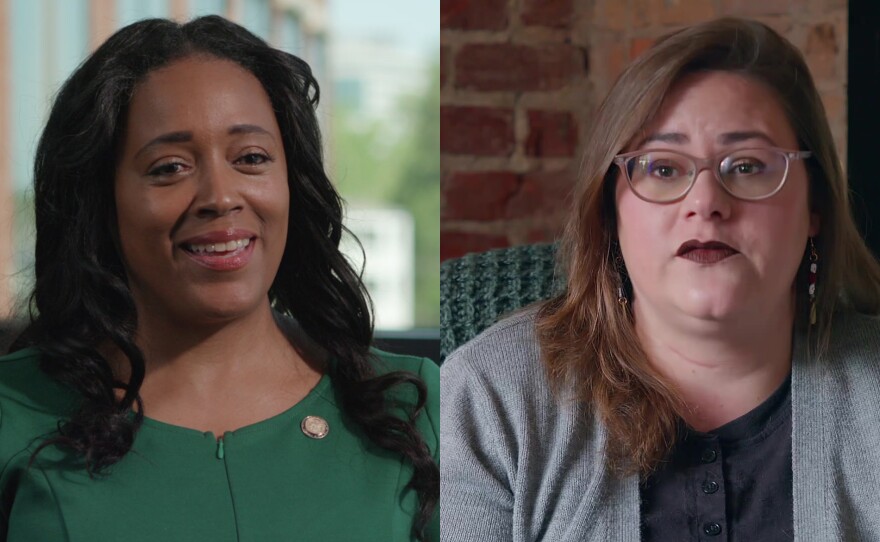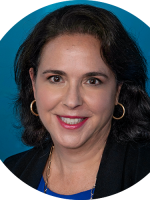The U.S. State Department considers human trafficking a form of "modern slavery." It happens when a person is forced to work or perform sex acts under threat of violence, often through coercion and fraud. Worldwide, over 27 million people are trafficked every day — and 90% of female victims are sexually exploited.
In Virginia, the Richmond FBI reports an increase in cases this year. Last summer, Gov. Glenn Youngkin established the Commission on Human Trafficking and Survivor Support to bring law enforcement, trauma experts and survivors together to combat this crime.
Two survivors share their stories of being trafficked for sex as teenagers. Today, they both serve as members of Governor Youngkin’s Commission on Human Trafficking Prevention and Survivor Support. Pamela Lynn Hock is an educator, advocate and survivor who counsels survivors and offenders. Tanya Gould is the director of the Anti-Human Trafficking Office of the Attorney General of Virginia. They dispel many myths about trafficking victims. Sergeant Justin Cowan and State Trooper Zane Gray of the Virginia State Police discuss law enforcement’s efforts to protect victims and educate the public.
Note: This transcript has been edited for length and clarity.
PAMELA LYNN HOCK (EDUCATOR, ADVOCATE, SURVIVOR): No matter how large or how small this city is, we need to focus on the idea that sex trafficking victimization of humans knows no poverty line, it knows no bounds in terms of status, it doesn't care. You know, we live in this cute little state of Virginia. And people ask how it compares, you know, well, it's not as bad as New York, it's not as bad as San Diego, it's bad enough for me. And one case of sex trafficking should be enough for people to care.
PAMELA LYNN HOCK: [speaking at a public event]: You see, I'm a survivor of sex trafficking from the age of 13, to almost my 18th birthday.
PAMELA LYNN HOCK: I had this one friend that I would spend a lot of time with. And unfortunately, this friend came from a very abusive household, and they had a much older brother, who was involved in drugs and, and gun violence. And the day came where we were victimized by her brother and his friends, they began to continually abuse us — and then give us to, when I say give us, it's under threat and coercion. Like, "You need to go with this friend or this person and do these things for them, because we're telling you to."
I was taken from my home and my family. And I was forced to do things that no one should ever have to do.
PAMELA LYNN HOCK: One of the questions that I get is, "Why didn't you leave?" We were children. And we did not have the developmental processes to let alone process the trauma that happened to us, and then have the wherewithal to feel like we would be safe enough to tell someone and so we believed everything that they told us, when they said, "We're going to murder you, if you don't do what we tell you to do."
We believed them.
VIRGINIA STATE TROOPER ZANE GRAY: I think, one, they're afraid, because most of the time, they work under a master. And they pretty much have them in their control. So, they're very, very fearful of what the repercussions to them could be.
PAMELA LYNN HOCK: [speaking at a public event]: So, there was a girl that I once knew. And her name was Allison. The last time I saw Allison, we were locked in a closet together in a hotel room outside Charlottesville.
PAMELA LYNN HOCK: I remember the closet door opened and one of our traffickers grabbed her arm and she wouldn't let go of me and she was just screaming. And they ripped her off of me and the closet door closed and I heard a few thuds. And then I heard a gunshot. And that was the last time that I ever saw Allison.
PAMELA LYNN HOCK: [speaking at a public event]: See, if you didn't comply with the rules, then you were not worth anything to them to keep you alive, so they just decided that your life isn't worth anything.
PAMELA LYNN HOCK I think that the average American believes that trafficking victims survivors are people who are standing on the corner.
FIRST SERGEANT JUSTIN COWAN (VIRGINIA STATE POLICE): Unfortunately, the crime of human trafficking can happen anywhere. It can happen in the homes that are in the very corner of Western Virginia. It can happen in the Richmond metro area, Hampton Roads, Northern Virginia. With the nature of communication today and the internet being what it is, this can really happen anywhere. There's no one agency that is uniquely equipped to tackle the human trafficking issue alone. So, we come together, we play to each other's strengths and fill the gap on weaknesses in order to best serve the victims of this crime.
PAMELA LYNN HOCK: I got my first degree in EMS in paramedic studies, and then I got a criminal justice degree. Then I went to school for psychology, and I got my bachelor's degree. And then I got my master's degree in forensic psychology. A part of my advocacy and educational work is going to universities to speak about trafficking. And I get calls all the time from universities to go talk to those students.
PAMELA LYNN HOCK: And my most recent project was to be on the Human Trafficking Prevention and Survivor Support Commission for the State of Virginia.
The purpose of the commission was to come together and address three main points, education, survivor support and law enforcement side of how can we come together and support survivors, create laws and educate the community about trafficking.
I was excited about the opportunity to have my voice as a survivor and you know, the other survivors who were with us.
They just know that what they did was wrong, because they did it.
Watch an interview with Attorney General Jason Miyares about human trafficking in Virginia: Attorney General Jason Miyares discusses efforts to end Human Trafficking in Virginia
TANYA GOULD (DIRECTOR, ANTI-HUMAN TRAFFICKING OFFICE, ATTORNEY GENERAL OF VIRGINIA): [speaking at a meeting]: I actually went to Chesterfield County Jail and did a talk with another survivor.
TANYA GOULD: My name is Tanya Gould, and I'm the director of Anti-Human Trafficking for the Office of the Attorney General.
TANYA GOULD: [speaking at a meeting]: Now one girl, she didn't have a prostitution charge.
TANYA GOULD: The commission has survivors that were also part of the commission in order to really give us good insight as to what survivors need. And that's how you walk away with real, tangible, long-lasting, beneficial reach into vulnerable populations specifically. When you think about it, survivors, you know, being a survivor myself — you know, we understand the thought that society sees us as criminals.
And so, to be able to bring that mindset to the table to say, "Well, we're not criminals, we're actually victims," and the process from understanding what it means to go from victim to survivorship. That's important for people who are leaders in a movement who are creating legislation and who are doing programs, it's important for them to understand that journey and that process.
TANYA GOULD: I didn't have love and support and validation growing up as a child, it was all about surviving and trying to figure things out, and you know, doing a lot of things on my own. So, when someone comes into your life, and realizes you didn't get those things, that's where they can, you know, play on you to do things their way.
TANYA GOULD: [speaking at a meeting]: Did any of them disclose that they were trafficked as teenagers?
TANYA GOULD: I remember one time when I was with my trafficker, and we were recruiting, and I saw a really pretty girl. And you know, I'm like, "Oh, my goodness, she's so beautiful. What about her?"
And he says, "No, that wouldn't work. Look how confidently she's walking. Look at her walking with her head up in her back straight." And at the time, I didn't get it.
But I understand now, the beauty that I saw was confidence. And it was worth. It was value. She knew who she was. I didn't know who I was. Right. And so that's what my trafficker took advantage of. Knowing my worth and my value and, you know, all of those things, that is a deterrent when we're talking about prevention, human trafficking prevention.
I'm gonna do what I have to do to survive and to continue to tell my story.
PAMELA LYNN HOCK: The public has a responsibility to know and understand what they're seeing around them, what is happening within their communities so that they can support survivors. They can support victims; they can take action. They can also know when legislation is being passed, and bills come up, what they need to support. So, education is important so that we can change society's mind about what trafficking looks like to them.
VPM NEWS FOCAL POINT: While anyone can become a victim of human trafficking, those who are especially vulnerable include runaways, unhoused youth, those with mental health and substance abuse concerns, and victims of domestic violence or sexual abuse. People of color are disproportionately victimized by sex trafficking. Law enforcement experts recommend if you see something, say something. Dial pound 7-7 to report suspected trafficking to Virginia State Police.
Resources
In emergency situations, call 988 or 911
Virginia State Police: Dial #77 to report instances of trafficking or suspected trafficking
National Suicide Prevention Lifeline: 1-800-273-8255
- Deaf or Hard of Hearing? 1-800-799-4889
- En Español: 1-888-628-9454
Mental Health America of Virginia Warm Line: 1-866-400-MHAV (1-866-400-6428)
- Monday to Friday, 9 a.m. to 9 p.m.
- Saturday, Sunday and Holidays, 5 p.m. to 9 p.m.
- Spanish Services (Friday and Saturday), 5 p.m. to 9 p.m.
- Text/Chat Support (Wednesday, Friday, Saturday), 5 p.m. to 9 p.m.
Veterans Crisis Line & Military Crisis Line: 1-800-273-8255, Press 1Crisis Text Line: 741-741
National Center for Missing and Exploited Children: 1-800-843-5678 (1-800-THE-LOST)
National Alliance on Mental Health: 1-800-950-NAMI (1-800-950-6264)
Virginia 2-1-1 resources: Dial 211 for help with housing, food, mental health and emergency assistance.
National Domestic Violence hotline: 800-799-SAFE (1-800-799-7233)
National Sexual Assault Hotline: 800-656-HOPE (1-800-656-4673)
National Human Trafficking Referral Directory: directory of anti-trafficking organizations and programs that offer emergency, transitional, or long-term services to victims and survivors of human trafficking
Polaris Project: Polaris works to reshape the systems that allow for sex and labor trafficking in North America and operates the U.S. National Human Trafficking Hotline








